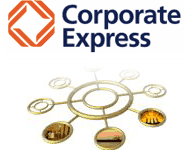Corporate Express in hosted hub handling heaven
Anthony Doesburg, Auckland. Acknowledgements to COMPUTERWORLD
 |
Using third party document conversion to standardise the processing of incompatible orders from customers has enabled Office supplies company Corporate Express to pass on savings to its customers. Corporate Express' catalogue contains 5000 items ranging from pens and paper to furniture, hardware and coffee for thousands of customers. It has its own internet ordering system called Net Express which interfaces with its back-end systems but many smaller customers still place orders by phone, email and fax. "We're trying to streamline the order process and take out manual intervention where we can. We've had about 20 people involved in re-keying orders and they're now being freed up for other tasks as orders increasingly flow straight through to the warehouse," says Corporate Express e-business manager Grey Taylor. |
For larger companies that process is handled by IBM's WebMethods e-commerce module but other clients are increasingly using the services of third party message broker Tranzsoft to automate orders. Auckland District Health for example had previously been sending purchase orders by fax because its Oracle system was incompatible with that used by Corporate Express. Orders are now sent by file transfer protocol (FTP), converted to the correct format at Tranzsoft's hub then communicated by secure http (https) to the office products supplier.
The translation deal with Tranzsoft involves a transaction cost which says Mr Taylor is far outweighed by the value of having customers dealing on-line. "We need to drive costs out of our own businesses so we can do this for our customers as well. The greater the volume the more the transaction costs come down," he says.
"We're now looking at automating email and fax orders from other clients to ensure they have a proper structure. This means orders will be processed more quickly and require less front-line customer service staff, although we'll still need as many in the warehouse to pick, pack and dispatch."
Most of Tranzsoft's customers prefer to keep the intermediate process hidden from the customer because they see it as a commercial advantage, or like to create the perception they're handling the entire process themselves.
Tranzsoft director Rod Hall says the market is growing exponentially as organisations discover that processing orders and invoices electronically increases efficiency and accuracy, cuts down paper flow, and reduces the need for re-keying incompatible documents.
"Rather than printing off a flat file from CBA accounting package and then faxing it we remove that step via the fax gateway and put it directly into the system. Rather than print an Excel spreadsheet, it can be saved as a comma-delimited text file and sent via FTP which we then transfer into the receiver's requirements," says Mr Hall.
He says larger corporates are generally only geared to work electronically with companies of similar size leaving only about 17 per cent of their supply chain actually engaged in electronic document transfer. That means about 80 per cent of the supply chain offers no cost relief, and still use faxes - many don't have a connection to the internet yet.
Mr Hall says latest statistics show 70 per cent of the employer base is companies that employ less than 10 people and of that, according to the government and Trade New Zealand, a surprising per cent of businesses still don't have an internet connection. "That'll change as more and more companies demand their suppliers trade electronically."
"You might have an ERP or accounting program which sends the purchase order out and whatever file format you use, Tranzsoft will relay that according to the receiver's requirements," says Mr Hall. "If you are a high volume, low margin business it can be quite a laborious thing re-keying faxes and emails," he says.